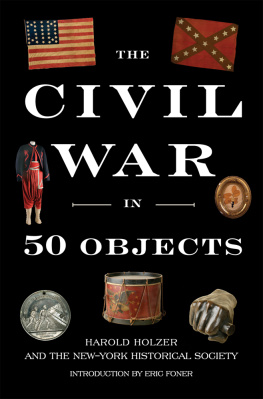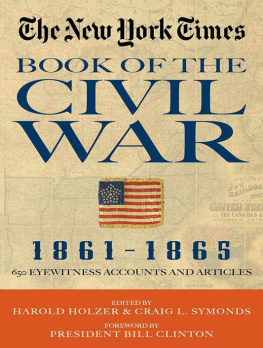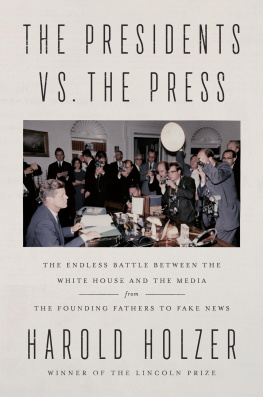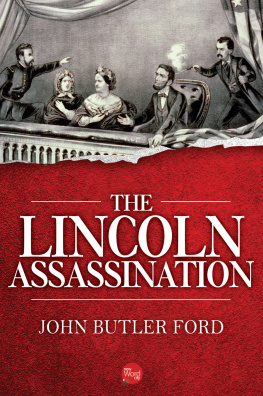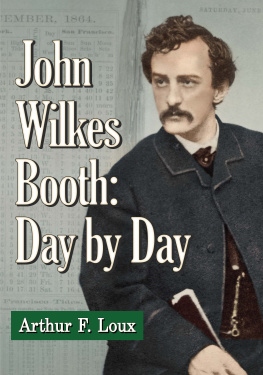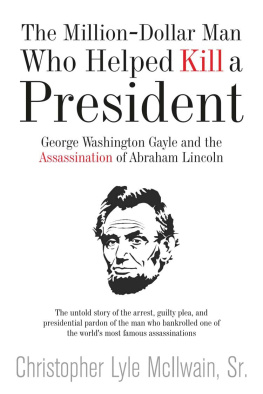2. The last photograph of Lincoln, March 6, 1865, by Henry F.
Warren.
3..
6..
8..
1013..
15..
16..
19. Lincolns funeral procession in New York City, photograph by
Robert N. Dennis.
Introduction
Shortly before he fell victim to an assassins bullet, a spectrally haggard, sleep-deprived Abraham Lincoln had a portentous dreamor so his longtime friend and aide, Ward Hill Lamon, later remembered. Not until ten days after was the President ready to unburden himself by sharing the details of his haunting nightmare. And then he told not only Lamon, but also his chronically anxious wife, Maryeven though he insisted that he did not believe in dreams and urged his listeners to take no heed, either.
Awakened from a deep slumber by the sound of subdued sobs, as Lincoln began his recollection, he dreamt that he left his bed to prowl the empty White House in search of the source of the commotion. Slowly he headed downstairs alone, greeted only by the ever louder mournful sounds of pitiful sobbing. Finally reaching the East Room, he came face-to-face with what he called a sickening surprise.
Before me was a catafalque, Lincoln told his enthralled listeners, on which rested a corpse wrapped in funeral vestments and encircled by military guards and a throng of tearful mourners. Who is dead in the White House? Lincoln recalled demanding of one of the soldiers. The President, came the sad reply; he was killed by an assassin! A loud burst of grief from the crowd then woke the dreamer from his slumber. Quoting Hamlet, Lincoln admitted, I slept no more that night, for to sleep was perchance to dream.
That is horrid, Mary Lincoln declared when her husband finished his chilling story. I wish you had not told it.
Well, drawled her husband, as if liberated from the disturbing vision, it is only a dream, Mary. Let us say no more about it.repeated it for Lamon twice more in the days before the Civil Warand Lincolns life as wellcame to an end during a week of seismically contrasting peace and violence, a week like none other in American history.
No dream but a horrific reality gripped the nation that mid-April of 1865: a shocking presidential murder, fear that the entire federal government was under attack, and a massive dragnet to capture the assassination conspirators, followed by their widely reported trial and punishment. Uniquely, the insatiable appetite for news of the crime manifested itself even as the first public funeral took place to honor the once-partisan, frequently mocked, now almost universally beloved martyr. As this collection of firsthand recollections, eyewitness reportage, and retrospective lamentations will demonstrate, Americans managed simultaneously in the spring and summer of 1865 to mourn passionately their fallen leader and to hungrily consume the latest updates about the hunt for his killer.
Americans had never before been whipsawed by such emotional upheaval, or produced such an avalanche of breathlessly read journalism and literature about a single violent event. While other volumes have variously analyzed the biggest crime of the nineteenth century, probed the grief it inspired, or detailed the dramatic hunt for the conspirators and their subsequent trial, conviction, and execution, what this collection makes vividly clear is how all these stories unfolded simultaneously before stunned contemporaries. The accounts are presented here in their original formjust as they first transfixed American readers a century and a half agolaying bare the nations concurrent obsessions with justice, vengeance, and deification. Here are the very words that contemporary citizens digested as these horrifying and mournful events first unfolded, with dirge competing with drama.
Certainly no manhunt in American history ever assumed the high dramaor attracted the vast audienceas did the pursuit of Abraham Lincolns killer and his gang. Unknown to all but a handful of plottersand perhaps the Confederate government as well, it was later chargedthese conspirators had hatched their plan to murder Lincoln in the jubilant days following Confederate General Robert E. Lees surrender to Ulysses S. Grant at Appomattox Court House, Virginia, on April 9.
A lightning bolt of vengeance was the last thing on the publics mind that week, though the constant threat of assassination had long concerned those closest to Lincoln. Dreams aside, the risk had been very much on Ward Hill Lamons mindas well as Lincolnsfor years. One summer evening in 1862, a would-be murderer, or perhaps a confused Union sentry, had put a bullet through the Presidents trademark stovepipe hat as the tall target rode alone on horseback from the White House toward his summer residence at the Soldiers Home three miles north of downtown Washington. No one ever identified the shooter, though Lincoln himself dismissed him as a disloyal bushwhacker. Lamon insisted he never ride alone again, and Lincoln reluctantly agreed, though he was heard to scoff: Oh, assassination of public officers is not an American crime.
Nonetheless, more than one White House visitor noticed a bulging folder stored in the pigeonhole desk in Lincolns private office. The President kept it filed under Afor Assassinationand filled it with the scrawled threats that arrived routinely at the mansion (the brutalities, enmities, and infamies of the Presidents letter-bag, according to his correspondence clerk, William O. Stoddard).
Such threats seemed far from the Presidents mind on the warm afternoon of Good Friday, April 14, 1865, when, duly accompanied by a military escort, Lincoln took his wife for a leisurely carriage ride through Washington. His recent nightmare forgotten, the President had brightened noticeably. I never saw him so supremely cheerful, Mary remembered; his manner was even playful... he was almost boyish, in his mirth. The long, bloody, hideously destructive Civil War was all but over, and a suddenly unburdened Lincoln savored the relaxing ride through the open air, telling his wife that he was bent on the theater later that night, religious holiday notwithstanding. We must


